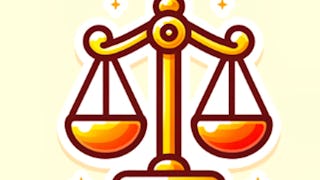This course focuses on the theoretical origins of ethics. There are many possible paths, but it seems that ethics found its origins in the early days after the emergence of Homo Sapiens.

3 days left: Get a Black Friday boost with $160 off 10,000+ programs. Save now.


A Theoretical Origin of Ethics in Business and Tech Industry
This course is part of Ethical Decision-Making in the Tech Industry Specialization

Instructor: Daniel Moorer
Included with
Recommended experience
What you'll learn
Understand the origins of human morality.
Understand the meaning of eusociality as it relates to human beings.
Understand cultural effects on current business ethical decision making.
Understand the effects of rapid technological advancement on ethics.
Skills you'll gain
Details to know

Add to your LinkedIn profile
See how employees at top companies are mastering in-demand skills

Build your subject-matter expertise
- Learn new concepts from industry experts
- Gain a foundational understanding of a subject or tool
- Develop job-relevant skills with hands-on projects
- Earn a shareable career certificate

There are 3 modules in this course
This module addresses the possible origins of ethics. It examines, from an evolutionary standpoint, theories about the emergence of Homo Sapiens and its survival instincts, some of which might be considered, in today’s terms, ethical traits associated with the best interests of the individual. It also considers the emergence of the family group and small tribes where a different set of traits were admired and expected; those that were associated with the interests of the group. Lastly, we consider the emergence of larger groups and small societies where societal norms modified ethics even further.
What's included
3 videos9 readings3 discussion prompts
This module goes further than Lesson 1, examining the concept of eusociality that describes traits that define exceptionally successful species. Further, we examine the concept of social evolution. From both of these discussions, one may draw further conclusions about the human ethical makeup and why we operate the way we do.
What's included
2 videos5 readings2 discussion prompts
This module builds on the two previous ones, drawing conclusions about human nature. Having a better understanding of how, perhaps, we came to be who we are today may help a leader to better understand the people who work with them and why they operate the way they do. Moreover, the leader may begin to understand that each person has conflicting traits: some concerned with individual survival (selfishness), and some concerned with the well-being of the organization (altruistic).
What's included
3 videos5 readings1 peer review3 discussion prompts
Earn a career certificate
Add this credential to your LinkedIn profile, resume, or CV. Share it on social media and in your performance review.
Build toward a degree
This course is part of the following degree program(s) offered by University of Colorado Boulder. If you are admitted and enroll, your completed coursework may count toward your degree learning and your progress can transfer with you.¹
Instructor

Offered by
Explore more from Leadership and Management
 Status: Free Trial
Status: Free TrialUniversity of Colorado Boulder
 Status: Free Trial
Status: Free TrialUniversity of Colorado Boulder
 Status: Preview
Status: PreviewRutgers the State University of New Jersey
 Status: Free Trial
Status: Free TrialUniversity of Colorado Boulder
Why people choose Coursera for their career





Open new doors with Coursera Plus
Unlimited access to 10,000+ world-class courses, hands-on projects, and job-ready certificate programs - all included in your subscription
Advance your career with an online degree
Earn a degree from world-class universities - 100% online
Join over 3,400 global companies that choose Coursera for Business
Upskill your employees to excel in the digital economy
Frequently asked questions
To access the course materials, assignments and to earn a Certificate, you will need to purchase the Certificate experience when you enroll in a course. You can try a Free Trial instead, or apply for Financial Aid. The course may offer 'Full Course, No Certificate' instead. This option lets you see all course materials, submit required assessments, and get a final grade. This also means that you will not be able to purchase a Certificate experience.
When you enroll in the course, you get access to all of the courses in the Specialization, and you earn a certificate when you complete the work. Your electronic Certificate will be added to your Accomplishments page - from there, you can print your Certificate or add it to your LinkedIn profile.
Yes. In select learning programs, you can apply for financial aid or a scholarship if you can’t afford the enrollment fee. If fin aid or scholarship is available for your learning program selection, you’ll find a link to apply on the description page.
More questions
Financial aid available,

